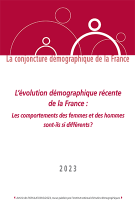
Le monde privé des femmes
Genre et habitat dans la société française On sale 9th november 2018
Collection : Questions de populations
n° 3, 2018, 288 pages
Preface, Olivier Schwartz
Introduction. New questions for an old topic
[Appendix: Men’s and women’s participation in domestic work]
Part 1. Gender, home, and housing: a range of perspectives
Chapter 1. Gender in sociological approaches to living space in France, Susanna Magri
Chapter 2. Approaches to women and housing in Quebec: feminist research and activism, Damaris Rose
Chapter 3. The home, intimacy, and gender, Michel Bozon
Part 2. Lifestyles and housing: struggles for space
Chapter 4. Working-class apartment buildings in Paris during the Belle Époque: gender- and class-specific territories, Anaïs Albert
Chapter 5. Before-dinner drinks: a moment when men appropriate the home, Benoit Coquard
Chapter 6. The recomposing of gender relations in feminist squats, Edith Gaillard
Chapter 7. Women in peri-urban areas: reinventing a lifestyle? Lionel Rougé
Chapter 8. Homeless men and homeless women: differential treatment? Marie Lanzaro
Part 3. Domestic economies
Chapter 9. Budget management: a paradoxical source of power for working-class and poorer women, Ana Perrin-Heredia
Chapter 10. Real estate assets: a gender analysis of property, Sibylle Gollac
Chapter 11. Making women pay: the sex of rent-collecting, Camille François
Chapter 12. Buying, repairing, renovating real estate: a means for working-class families to resist status fall? Cécile Vignal
Chapter 13. Female child minders, cleaning women, and domestic helpers: a return to the home? Christelle Avril
Chapter 14. Housing as a financial resource: female professional apartment leasers, women rentiers, landladies, Marie-Pierre Lefeuvre
Afterword, Catherine Cavalin
[The private world of women: gender, home, and housing in French society]
Recent changes in family structure and the world of work have changed the ways that housing is implicated in constructing gender-specific identities and power relations between the sexes.
Has the fact that most women are now income earners changed attitudes toward living spaces or real estate buying, renting, and subletting strategies? Has the tie between women and the home changed with the emergence of contemporary types of domesticity and home and at-home employment? Is the home still primarily a place of masculine domination?
Moving beyond a reified vision of power relations in the private sphere, this work shows how living spaces can, under some conditions, become places of self-assertion for women—in groups of underprivileged people, for example—while confirming just how fragile that balance still is.
The various contributions analyze the home as a locus of life, and living spaces generally as social environments. The authors insist on the value of opening up the home space by examining some of the ways it is connected to the work sphere. In its investigation of the material, symbolic, economic and legal dimensions of living spaces in France, this work opens up new research perspectives.
The sociologist Anne Lambert is a researcher at INED and associated researcher at the Centre Maurice Halbwachs. Her work focuses on home acquisition and loan subscribing in modest-income households and the effects of having a mobile job (flight attendant, for example) on conjugal relations, parenting, and gender relations.
Pascale Dietrich-Ragon is an INED researcher and associated researcher at the Centre Maurice Halbwachs. Her research focuses on housing inequalities, residential precarity, and living conditions among working class and poor people. She has studied occupants of unhealthy housing, social housing applicants, and homeless people, and is now turning to the difficulties young people encounter obtaining housing in France.
Catherine Bonvalet is a senior researcher at INED and associated researcher at the CNRS Centre de Recherches Sociologiques et Politiques de Paris-Genre, Mobility, Travail (CRESPPA-GTM). Her research focuses on housing, family solidarity, and the baby boomers. She is currently studying the residential, geographic, and family trajectories of Île-de-France inhabitants born between 1911 and 1950 by way of data from a series of INED life history surveys.
Focus on: The private world of women






